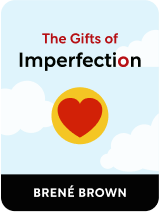

This article is an excerpt from the Shortform book guide to "The Gifts of Imperfection" by Brené Brown. Shortform has the world's best summaries and analyses of books you should be reading.
Like this article? Sign up for a free trial here .
Are you thinking of reading Brené Brown’s book Gifts of Imperfection? What is the book about and how can it help you?
Brené Brown is famous for her works regarding shame, worthiness, and vulnerability, among other topics. Her book The Gifts of Imperfection was an instant bestseller, but that doesn’t mean it’s free from flaws. This review of The GIfts of Imperfection covers the book’s content, structure, and more.
Continue below for our Gifts of Imperfection review.
The Gifts of Imperfection Review
Released in 2010, The Gifts of Imperfection is a New York Times bestseller by researcher, speaker, and author Brené Brown. It’s one of many works by Brown on the themes of overcoming shame, embracing vulnerability, and learning to accept ourselves—flaws and all.
The “gifts” of imperfection referred to in the book’s title are courage, connection, and compassion. These are “gifts” of imperfection because they come about only when you’re willing to be vulnerable—you develop the courage to accept that you’re imperfect, you connect with other people because they empathize with your vulnerability, and you become compassionate with other people because you realize nobody’s perfect and forgive their imperfections.
In contrast, if we all lived perfect lives free from vulnerability, struggles, and mistakes, we’d never need to put these values into practice—meaning we’d never reap their benefits.
About the Author
Brené Brown is a writer, speaker, and researcher who currently holds positions at the University of Houston and the University of Texas. The main focuses of her work are:
- Shame, and overcoming it
- The concept of “worthiness” (in simple terms, feelings of self-worth)
- The importance of being vulnerable
- Bravery, and its links to authenticity and vulnerability
- How to apply the principles of vulnerability and bravery to leadership
Brown has a slew of famous fans, from Prince Harry of the United Kingdom to Melinda Gates. She gained prominence as a shame researcher and storyteller in 2010 after giving a viral TEDxHouston talk on shame, vulnerability, and self-worth.
Since 2010, Brown’s career has gone from strength to strength. She’s released four more New York Times bestsellers, including Daring Greatly, another book about vulnerability that raised her profile even further. It even attracted the attention of Oprah Winfrey, who’s subsequently featured Brown on her Super Soul Sunday program multiple times.
Brown’s other books include:
Brown has also produced audio works such as The Power of Vulnerability, a lecture series based on her work on shame and vulnerability.
Connect with Brené Brown:
The Book’s Publication
Publisher: Hazelden Publishing, partnered with Simon & Schuster
Published in the summer of 2010, The Gifts of Imperfection closely followed Brené Brown’s lauded June 2010 TEDxHouston talk. The book discusses similar topics to that talk: cultivating self-worth, combating shame, and living an authentic, “Wholehearted” life. The Gifts of Imperfection wasn’t Brown’s first book: She’d previously published works on her research into shame and vulnerability. However, it became her most popular book to date.
In late 2020, Brown released a 10th-anniversary edition of The Gifts of Imperfection, with a new foreword. (Note that this guide discusses the original edition of the book, not the 10th-anniversary re-release.)
Critical Reception
Upon its publication, The Gifts of Imperfection topped the New York Times bestseller list and enjoyed sales in the millions. The book’s success may have been down to a shift in Brown’s method of expression: Starting with The Gifts of Imperfection, her work began to blend data and research with storytelling. Specifically, Brown started to relate her own anecdotal experiences of the concepts she discussed, becoming more candid about her own struggles with shame and low self-worth. This proved to be a combination that resonated with many readers.
In the years since The Gifts of Imperfection’s release, many readers have lauded the book as life-changing and affirming, highlighting its simple principles for living a more fulfilling life. Furthermore, the book has been regularly praised in media outlets: Forbes described it as one the best books of the 2010s in its genre. Likewise, nearly a decade after the book’s publication, the Evening Standard recommended it to readers as a seminal work on improving your mental health.
The book is not without critics. Some online reviewers have bristled at what they see as Brown’s outsized focus on herself in The Gifts of Imperfection, reviews say that the book doesn’t contain enough practical advice for living Wholeheartedly and that its principles ring hollow as a consequence. Furthermore, some readers find that Brown covers the topics of shame and vulnerability much more exhaustively and effectively in her subsequent book Daring Greatly.
Commentary on the Book’s Organization
The Gifts of Imperfection begins with a primer on the concepts of worthiness, Wholehearted living (which can mean, simply, “living with a strong sense of self-worth”), and shame. Brown introduces these concepts early because she refers to them throughout the book: Therefore, a reader’s understanding of the book is much enhanced if she understands Brown’s definitions of these concepts early on.
Brown discusses these concepts through the introduction and first three chapters of the book. She sometimes jumps back and forth between discussing different concepts: For instance, she returns to defining worthiness in a chapter on shame. At times, this disjointedness can make the logic of these chapters difficult to follow.
After the primer, Brown introduces various strategies for living Wholeheartedly, dedicating a chapter to each strategy. Keeping a “one chapter per strategy” organization means the information on each strategy is self-contained. In some ways, this structure is effective—it means that if a reader wants to apply only three of the ten strategies, they can simply read three chapters of the book without missing any crucial information about these strategies.
However, a weakness of this siloed structure is that it obscures the fact that many of the strategies are thematically similar and would work well applied in tandem. For instance, the strategies of rejecting comparison and being authentic are both rooted in helping the reader to love and accept themselves: a connection the reader may not make if they read about each strategy in isolation.
Commentary on the Book’s Approach
Brown’s approach to developing ideas in this book, as with her later books, is organic—she weaves together anecdotes, ideas on feeling worthy, and suggested actions without following a clear regimented structure. While this provides an engaging read, for readers who prefer logically straightforward books, it can be difficult to pull out the main ideas and relate them logically to each other.
Furthermore, as critics have noted, Brown’s strategies for living Wholeheartedly are sometimes overly theoretical and light on practical advice. For instance, they might state that you need to do something—like free yourself from societal expectations of how you should behave—but not give advice on how you might do it. Again, while these strategies are insightful and engaging to read about, their lack of detail may be frustrating for readers looking for step-by-step guidance on how to live Wholeheartedly.

———End of Preview———
Like what you just read? Read the rest of the world's best book summary and analysis of Brené Brown's "The Gifts of Imperfection" at Shortform .
Here's what you'll find in our full The Gifts of Imperfection summary :
- How to stop feeling like you're not "good enough"
- How shame affects your self-worth
- The 10 guideposts to living Wholeheartedly and cultivating worthiness






